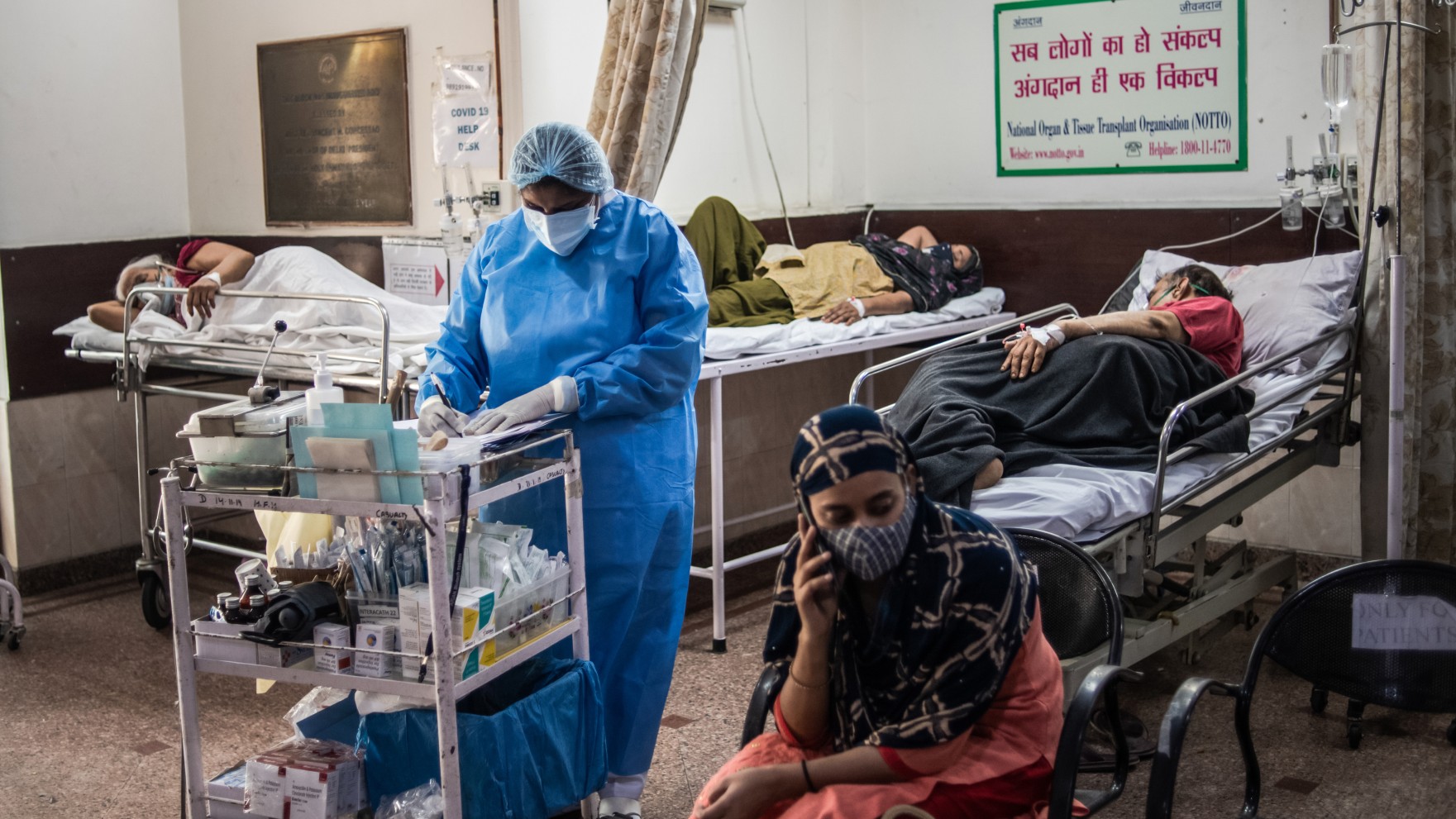What is the ‘black fungus’ killing Covid patients?
India reporting surge in fatal mucormycosis infections in people who have recovered from coronavirus

A free daily email with the biggest news stories of the day – and the best features from TheWeek.com
You are now subscribed
Your newsletter sign-up was successful
A rare “black fungus” that kills around half of all infected people is being reported in a growing number of former Covid-19 patients in India.
The fungus can spread rapidly, with some patients forced to have their jaw bone, nose or eyes removed in order to prevent it from reaching their brain.
What is it?
The Week
Escape your echo chamber. Get the facts behind the news, plus analysis from multiple perspectives.

Sign up for The Week's Free Newsletters
From our morning news briefing to a weekly Good News Newsletter, get the best of The Week delivered directly to your inbox.
From our morning news briefing to a weekly Good News Newsletter, get the best of The Week delivered directly to your inbox.
The medical name for the rare fungal infection is mucormycosis, which is caused by moulds called mucormycetes. This group of fungi “are present throughout the environment, particularly in soil and in association with decaying organic matter, such as leaves, compost piles, and animal dung”, says the US Centers for Disease Control and Prevention (CDC).
According to the health agency, the infection commonly affects the sinuses or lungs after spores are inhaled, but can also enter the body through a cut, burn or other type of skin injury.
The fungus “grows incredibly fast”, says David Denning, a professor of infectious diseases at the University of Manchester and chief executive of the Global Action Fund for Fungal Infections (Gaffi).
And “once it gets in, it just marches through the tissue and doesn’t respect tissue planes, so it can go straight from ordinary tissue through into bone, into nerves”, he told The Telegraph.
A free daily email with the biggest news stories of the day – and the best features from TheWeek.com
Symptoms include a stuffy and bleeding nose, pain and swelling in the eyes, blurred vision and sometimes black patches around the nose.
Before the coronavirus pandemic, mucormycosis was “extremely rare” in India, with just a few cases annually, the paper reports. But now “leading hospitals across India are now seeing multiple cases daily”.
Why is it affecting Covid patients?
Experts say that mucormycosis mainly affects people who are in poor health or have taken medication that lowers their body’s ability to fight off germs and sickness.
In former Covid patients, the infection has been linked to “the use of steroids”, the BBC reports. While the drugs are “a life-saving treatment” for people battling severe cases of the coronavirus, the resulting drop in immunity is thought to be triggering cases of mucormycosis.
People with diabetes are also much more likely to become infected with the black fungus, and steroids can push up blood sugar levels. “Diabetes lowers the body’s immune defences, coronavirus exacerbates it, and then steroids which help fight Covid-19 act like fuel to the fire,” Dr Akshay Nair, a Mumbai-based eye surgeon, told the broadcaster.
Another possible reason for the rise in cases may be that, with hospitals overwhelmed, “many families are self-medicating and applying oxygen therapy at home without the proper hygiene”, says The New York Times.
The BBC reports that an anti-fungal intravenous injection that “has to be administered every day for up to eight weeks is the only drug effective against the disease”. But many people in India cannot afford the jabs, which cost 3,500 rupees (£33.75) per dose.
Dr Renuka Bradoo, head of the ear, nose and throat wing in Mumbai’s Sion Hospital, told the broadcaster that of 24 mucormycosis patients who she had treated in the past two months, 11 had to lose an eye and six died.
“It’s a nightmare inside a pandemic,” Bradoo said.
-
 What are the best investments for beginners?
What are the best investments for beginners?The Explainer Stocks and ETFs and bonds, oh my
-
 What to know before filing your own taxes for the first time
What to know before filing your own taxes for the first timethe explainer Tackle this financial milestone with confidence
-
 The biggest box office flops of the 21st century
The biggest box office flops of the 21st centuryin depth Unnecessary remakes and turgid, expensive CGI-fests highlight this list of these most notorious box-office losers
-
 A Nipah virus outbreak in India has brought back Covid-era surveillance
A Nipah virus outbreak in India has brought back Covid-era surveillanceUnder the radar The disease can spread through animals and humans
-
 How music can help recovery from surgery
How music can help recovery from surgeryUnder The Radar A ‘few gentle notes’ can make a difference to the body during medical procedures
-
 The new Stratus Covid strain – and why it’s on the rise
The new Stratus Covid strain – and why it’s on the riseThe Explainer ‘No evidence’ new variant is more dangerous or that vaccines won’t work against it, say UK health experts
-
 Deadly 'brain-eating' amoebas could be spreading thanks to climate change
Deadly 'brain-eating' amoebas could be spreading thanks to climate changeUnder the Radar Naegleria fowleri causes rare and lethal infection, but recent uptick in cases suggests it is thriving in warming waters
-
 India's toxic alcohol problem
India's toxic alcohol problemUnder the Radar Bootleggers add lethal methanol to illegal liquor to cheaply increase potency, leading to widespread casualties
-
 Covid-19: what to know about UK's new Juno and Pirola variants
Covid-19: what to know about UK's new Juno and Pirola variantsin depth Rapidly spreading new JN.1 strain is 'yet another reminder that the pandemic is far from over'
-
 Vallance diaries: Boris Johnson 'bamboozled' by Covid science
Vallance diaries: Boris Johnson 'bamboozled' by Covid scienceSpeed Read Then PM struggled to get his head around key terms and stats, chief scientific advisor claims
-
 Evergreening: Big Pharma's big con
Evergreening: Big Pharma's big conThe Explainer Practice of extending patents stifles competition and can increase the cost of vital drugs to those most in need